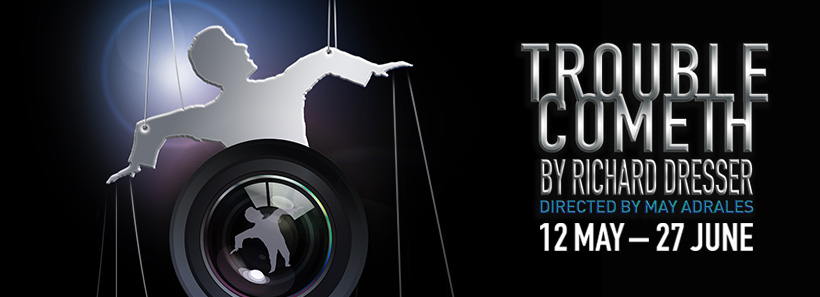
A SITCOM-LIKE, SEINFELD-LIKE COMEDY
The SF Playhouse offers a Pinteresque mad-cap via the world premiere of Richard Dresser’s “Trouble Cometh”—funny and true, from the minute it starts.
Five actors replicate a New York firm that produces TV reality shows. It assigns two writers the task of coming up with the next big thing. Joe (Kyle Cameron) is the unwitting newby whose sadistic boss Dennis (Patrick Russell) goads him at every opportunity.
Joe and Dennis have a deadline where the “line” part keeps changing with firing and rehiring of the uppers. There is a constant battle between the people upstairs and downstairs. Dennis insists on a meeting with them at 10:30 and they counter with 10:00 but that timeline varies as do other happenings in the play. There is constant surprise.
The one act play without intermission is constructed much like a sit-com with several short episodes. The two scenes take place either in the stark white office of Joe and Dennis or a trendy bar/restaurant. Nina Ball’s set is smart and offers a simple change from the two. In between are musical interludes engineered by the sound designer Theodore J.H. Husker. Seth Reiser’s lighting changes the mood from the harshness of the office to the low-lit and romantic bar. Tatiana Genser’s costume make Kelly the sexy secretary and Susan the frump.The director May Adrales comes from a rich background of directing and also served as the associate artistic director at The Public Theater in New York. In “Trouble Cometh” she has done a fabulous job of keeping the fast moving scenes lively, puzzling and above all amusing to the audience.
In the first scene Joe and Kelly (Liz Sklar) are at a bar talking about the up-coming wedding. He wants an intimate affair and she likes larger celebrations. I have to stop here so I don’t reveal the first surprise of the show. The next scene is the office where the enigmatic, quirky and changeable Dennis (Patrick Russell) is engrossed in reading a tabloid newspaper when Joe wants to get to work. Both men are dressed in suits and ties à la “Mad Men” style and they discuss their up-coming assignment to write a reality show. The fact that “the whole department is on the line” comes up often. Dennis slings his sour and sarcastic quips at his inferior Joe throughout. All five actors are terrific in their very separate and defined roles.
In the next scene at the bar, Joe presents his fiancée, who is Susan, not Kelly, suffering from a horrible outbreak of ugly red splotches on her face from stress. But despite little disagreements Susan (Marissa Keltie) is delighted about the beautiful engagement ring he gives her until she finds out it comes with an important caveat. All the scenes stop short, just like in a Seinfeld TV show.
Back and forth we go from bar to office from one encounter to another until their boss Vashti (Nandita Shenoy) comes to their office for a meeting about what they have proposed for a new reality show. She wears a sari and is very rigid and disapproving of them. Nevertheless, there is hope that their idea will fly. In one of the previous scenes we see how they try to “create” by writing together and this is simply hysterical, especially when they are proposing reality shows, each more preposterous than the next.
The story ends in a bang-up surprise party that becomes Pinteresque with its bizarre conclusion. Or should I say a Sartre “No Exit” kind of existential ending?
The playwright Richard Dresser has written plays and books for the Broadway musical “Good Vibrations” and “Johnny Baseball” that opens at the excellent A.R.T. in Cambridge, MA. The fact that the SF Playhouse is producing the world premiere of his “Trouble Cometh” Playhouse is testament to this organization’s good taste and willingness to bring new works by quality playwrights to San Francisco.
The hit “Trouble Cometh” runs through June 27. For info: (415) 677 9596 or go online.
#
© Carol Benet 2015
Carol Benet is a regular theater reviewer for artssf.com.
These critiques appearing weekly (or sometimes semi-weekly, but never weakly)focus on theater, dance and new musical creativity in performance, with forays into recordings by local artists, and a few departures into books (by authors of the region)as well.
#